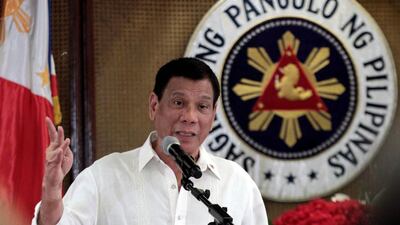Every couple of weeks or so, there is an outburst by Rodrigo Duterte. The recently elected president of the Philippines has already insulted Pope Francis, Barack Obama and the US ambassador to Manila. He has also threatened to withdraw from the United Nations because it is "useless" and "stupid", and thumbed his nose at the European Union.
At the East Asia Summit in Laos this month, he surprised fellow leaders by departing from his script and launching a tirade about American misdeeds in his country after it took over from Spain as colonial master in 1898. According to one delegate, he showed a picture of the victim of an American attack and said: “This is my ancestor they killed. Why now we are talking about human rights?”
The tone and content are usually so outrageous, the disregard for normally observed niceties so egregious, that it is easy to overlook the fact that some of the time, Mr Duterte’s references are to incidents that are both true and germane.
America’s record in the Philippines was shameful. The supposed allies in the war to liberate Filipinos from Spanish occupation swiftly extinguished the First Philippine Republic and hung on to the country until 1946. During the campaign to put down the country’s brief independence, US forces did indeed commit atrocities.
Before the Laos summit, Mr Duterte alluded to the Bud Dajo Massacre of 1906, when 800 men, women and children were killed by American troops on the island of Jolo during the Moro Rebellion.
Neither of these were rants about obscure historical events of little relevance except to a demagogue in need of an injustice to rail against. The latter was just one instance of well over a century of ill treatment and denial of self-determination to the Moro people of the southern Philippines.
The Christian majority of the Philippines steadily dispossessed the Moro of much of their land. In Mindanao, for example, Moros made up 90 per cent of the population at the beginning of the 20th century. By 2000, it was 20 per cent.
The disputes in the southern Philippines may seem very far off, shrouded in a history of which few are aware, and overlaid in recent years by stories of gruesome beheadings on islands most people would struggle to locate on a map.
But in the Middle East and the Muslim world, they should be of greater resonance because this is a long-running struggle of a Muslim people, the Moros, whose sultanates were smashed, whose territories were taken from them, and whose identity and culture were not accorded a proper place in a state that many believe has oppressed them.
It is a struggle that turned violent decades ago. Armed conflict began in the late 1960s, with various groups forming. The Moro National Liberation Front (MNLF) and its offshoot, the Moro Islamic Liberation Front (MILF), may both be considered serious and potentially responsible actors, while the ISIL-aligned Bangsamoro Islamic Freedom Fighters and the Abu Sayyaf gang are terrorists (the latter generally deemed to be an extortion outfit).
There have been many negotiations over the years, but none have brought an end to hostilities in which tens of thousands have died, and which have led to 3.5 million people being displaced since 2000. With the help of the Malaysian government, a peace deal was signed between the Philippines and the MILF in 2012, under which a Bangsamoro Autonomous Region would be set up.
But the law that was supposed to implement the agreement failed to pass in the Philippines Congress, and after the disaster of the Mamasapano Clash, in which Philippines special forces failed to tell the MILF that they were going after terrorists in their area, and a firefight left scores dead on all sides (the numbers are disputed), momentum drained.
It has returned, however, after the election of Mr Duterte. The first president from the south, a man who ran Davao City on Mindanao for more than two decades, he has a supermajority in Congress and gives the impression of being serious about pushing the peace process to conclusion.
He is not from an elite family from the northern provinces. While not a Muslim, he has made it clear that he wants peace with the Moros. He has said that the MNLF’s leader, Nur Misuari, should not be detained, despite there being a warrant for his arrest, with Mr Duterte’s peace adviser Jesus Dureza saying the MNLF veteran “will play a very important role because we cannot close the agreement if he is left out”.
Mr Duterte shows every sign of understanding the Moro position and of being sensibly inclusive in search of a peace that will last, while also ordering the army to destroy Abu Sayyaf, a group that will never come to the negotiating table.
The wild man of Philippine politics could just be the best hope for order and justice in his country’s south. He knows their history – and that a massacre over a century ago can still provoke burning anger today.
If he succeeds, no one will mind then if his rhetoric was frequently intemperate and inappropriate. Righting a wrong that the Muslim Moros have endured for far too long would etch his name into the history books – by which point the insults will have been forgiven as the amusing provocations of a president who actually got things done.
Sholto Byrnes is a senior fellow at the Institute for Strategic and International Studies, Malaysia


